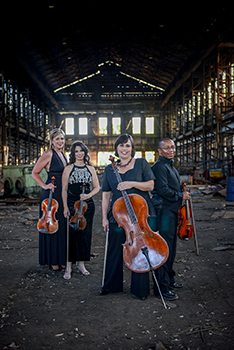
The Odeion String Quartet will build
international relationships when
it visits Tanzania and Austria.
Photo: Supplied
To be an ambassador for the University of the Free State (UFS) is a goal of the Odeion String Quartet (OSQ) and that is exactly what it will do through international visits to Tanzania and Austria. The OSQ, the only residential university quartet in South Africa, will play concerts abroad, share knowledge and build relationships.
It visits Dar es Salaam, Tanzania, from 17 to 20 November 2016 and Austria from 29 November to 4 December 2016. The quartet, which constitutes string lecturers at the Odeion School of Music, consists of Samson Diamond, Sharon de Kock, Jeanne-Louise Moolman and Prof Anmari van der Westhuizen Joubert.
A humbling experience
The OSQ was invited by Hekima Raymond, founder and conductor of the Dar Choral Society, to Tanzania to assist the symphony orchestra. Raymond is a self-taught pianist and conductor and was nominated for a BBC Outlook Inspirations award in 2016.
The quartet will lead the string sections of the orchestra, consisting of members from Uganda, Kenya and Tanzania, performing Beethoven’s fifth symphony and Verdi’s Requiem.
According to Diamond it is a humbling experience, an opportunity to extend their services and help establish the Dar Choral Society. “You are part of something really special, because the circumstances are remote if you compare it to what we have here.”
He means it is important to have a real African footprint and being involved there can later serve as a platform for UFS recruitment.
“You are part of something really special,
because the circumstances are remote if
you compare it to what we have here.”
South African and Austrian collaboration
According to Prof Van der Westhuizen Joubert it is an honour to play in Austria, as Europe is a centre for classical music. The OSQ will play concerts at the Alte Schmiede, Vienna, and the University of Salzburg.
The concert on 4 December 2016 at the University of Salzburg’s Mozarteum is a highlight because the UFS will have the opportunity to build relationships with the famous music school.
Prof Van der Westhuizen Joubert said it would be a South African/Austrian collaboration. “We will bring them South African works (Mokale Koapeng, AJ Feder, Arnold van Wyk and Peter-Louis van Dijk) and will be playing Austrian contemporary string quartets.”